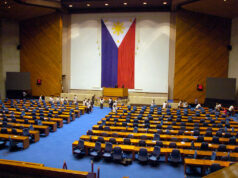Demonitizing large peso notes may harm economy, says BSP

DEMONETIZING P1,000 and P500 bills as an anti-money laundering measure may bring more harm than good to the economy, a top Bangko Sentral ng Pilipinas (BSP) official said.
“It’s a tantalizing proposal, but it’s not so simple,” BSP Governor Eli M. Remolona, Jr. told reporters on Monday. “To me, it’s like, you know the saying, you cut off your nose just to spite your face. You’re doing more damage than benefits.”
Mr. Remolona made the statement in response to former Finance Secretary Cesar V. Purisima’s suggestion to demonetize P1,000 and P500 bills to curb corruption, as it would make it more difficult to transport large sums of cash.
Some lawmakers, Public Works officials and private contractors have been embroiled in alleged corruption scandal involving flood control projects. In a Senate hearing last month, two former Public Works district engineers claimed that around P1 billion in cash was packed in suitcases and delivered to a lawmaker.
“Parang nabigla lang dun sa sight ng suitcases (I think they were just shocked at the sight of the suitcases). But if you think about it, it’s not going to stop these guys,” Mr. Remolona said.
The BSP chief also said the measure could only cause a small inconvenience for “corrupt contractors” but would burden many people, considering how widely used the large bills are.
“The P1,000 is used a lot. For a small inconvenience for corrupt contractors, you’re going to make life hard for many people,” he said.
Mr. Remolona said the BSP is still reviewing the suggestion and has yet to decide on it.
BSP Assistant Governor Maria Margarita Debuque-Gonzales also said the central bank is working on a paper that would detail the implications of demonetizing high-value peso bills.
Meanwhile, Mr. Remolona said the central bank’s daily cash withdrawal limit has been effective in deterring potential money laundering amid the ongoing corruption issue.
“I think it’s very effective so far. It’s the best we can tell. It’s a very effective measure,” he said. “There are complaints. And we’re listening to those complaints. But for now, I think it’s a good measure.”
Last month, the central bank issued a circular where only a maximum of P500,000 or its equivalent in foreign currency may be withdrawn at once or via multiple transactions within one banking day. It took effect on Oct. 7.
The BSP governor noted that banks welcomed the regulation, as several banks even began implementing it as early as Oct. 4.
“They love it,” he said. “They’ve always been suspicious of some transactions. But they couldn’t refuse… but now they can say, BSP yan eh (That’s BSP’s policy). It makes their life easier.”
Mr. Remolona, who also chairs the Anti-Money Laundering Council (AMLC), also said they plan to tap artificial intelligence (AI) and data scientists to help them sift through the “overwhelming” amount of suspicious transaction reports (STRs) amid the widening graft scandal.
“We are looking for the right AI and the right analysts, data scientists to improve (and) make full use of the STRs. I think we can do more. But we need help from AI,” he said in Filipino.
These STRs, regardless of amount, are filed by covered persons and are used by the AMLC to probe possible illegal financial activities such as money laundering and terrorism financing. — Katherine K. Chan



